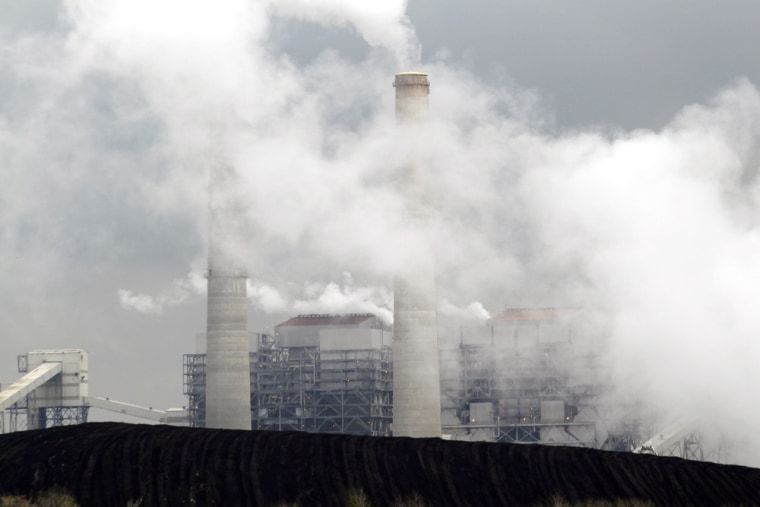The Obama administration on Wednesday unveiled rules for coal-fired power plants that mean costly investments passed on to consumers, but also health benefits.
Hundreds of older plants — which together make up the largest remaining source of unchecked toxic air pollution in the United States — will have to cut emissions or shut down.
"By cutting emissions that are linked to developmental disorders and respiratory illnesses like asthma, these standards represent a major victory for clean air and public health," Lisa Jackson, head of the Environmental Protection Agency, said in a statement.
The American Lung Association added its support, calling it a "huge victory for public health" and echoing EPA estimates that the rules will prevent 130,000 child asthma attacks and 11,000 premature deaths each year.
Power plant operators who have trouble meeting a three-year deadline to reduce emissions of mercury and other toxics will be given some flexibility under a deal struck between the White House and the EPA, the Washington Post reported last Friday.
The EPA estimates the rules will cost utilities $9.6 billion by 2016 to install special equipment known as "scrubbers."
About 40 percent of the 1,400 coal-fired units nationwide still lack modern pollution controls, despite the EPA in 1990 getting the authority from Congress to control toxic air pollution from power plant smokestacks. A decade later, in 2000, the agency concluded it was necessary to clamp down on the emissions to protect public health.
The Obama administration was under court order to issue a new rule, after a court in 2008 threw out the Bush administration's mercury rule that would have created a cap-and-trade system and exempted power plants from being listed as sources of toxic air pollution.
In a video released Wednesday afternoon, President Barack Obama said the decades of delays caused by special interest groups that resulted in standards never being put into place for power "was wrong."
"Today, my administration is saying, 'Enough'," he said.
When fully implemented in 2016, the standards will slash mercury pollution from burning coal by 90 percent, lung-damaging acid gases by 88 percent and soot-producing sulfur dioxide by 41 percent.
Companies that generate most of their power with "clean" fuel sources like nuclear, natural gas and renewables have supported the standards, while those that get most of their power from coal, including American Electric Power and Southern, have vigorously fought the rules.
Scott Segal, an energy industry lobbyist at Bracewell & Giuliani, said the rules will result in the loss of more than 1.4 million jobs by 2020 as utilities are forced to shutter old coal-fired plants. He estimated that for every temporary job created in technologies to clean up power plants four higher paying jobs, often union ones, will be lost.
"The bottom line: this rule is the most expensive air rule that EPA has ever proposed in terms of direct costs," he added. "It is certainly the most extensive intervention into the power market and job market that EPA has ever attempted to implement."
He also cited an industry-sponsored study that estimated areas with the most coal power plants could see electricity prices rise by 19 percent.
"Much is made of the current debate over extending the payroll tax holiday," he told msnbc.com. "The irony is that a middle class family may end up giving that entire tax benefit back in the form of higher utility bills."
EPA spokeswoman Enesta Jones countered that "EPA modeling indicates that these standards will result in relatively small changes in the average retail price of electricity (approximately 3 percent)."
The average age of the units at greatest risk of shutting down or being retired is 51 years old, the AP found, and they produce enough power for more than 22 million households.
Republicans had joined opponents, and in October the EPA delayed approval, saying it needed more time to review the 960,000 comments it received on a draft of the measure.
In response to concerns about the costs, the EPA has said the money saved in health care costs will be greater than the amount polluters will need to invest in retooling their plants to meet the new standards.
A group of 25 states has launched a court case over the rules, seeking a delay of at least a year for what they argue is an expensive measure that will shut down old coal-fired power plants.
Analysts have said American Electric Power and Duke Energy could see temporary shutdowns because of the rules.
To ease those concerns, the EPA will encourage states to make "broadly available" an additional fourth year to comply. Case-by-case extensions could also be granted to address local reliability issues.
The EPA, which had also been sued by environmental groups to finalize the rule, has maintained that the regulation is needed to prevent illnesses and deaths caused by air pollution.
Environmentalists were pleased with the final rules.
"After decades of industry-induced delay, the Environmental Protection Agency did exactly what it was designed to do: look out for our health and our environment," said Frances Beinecke, president of the Natural Resources Defense Council.
The EPA estimates the rules will save $37 billion to $90 billion in health care costs each year by 2016 as technology to cut mercury emissions also reduces emissions of fine particulates, which can damage hearts and lungs.
The EPA also unveiled a website with details about the rules: www.epa.gov/mats/
